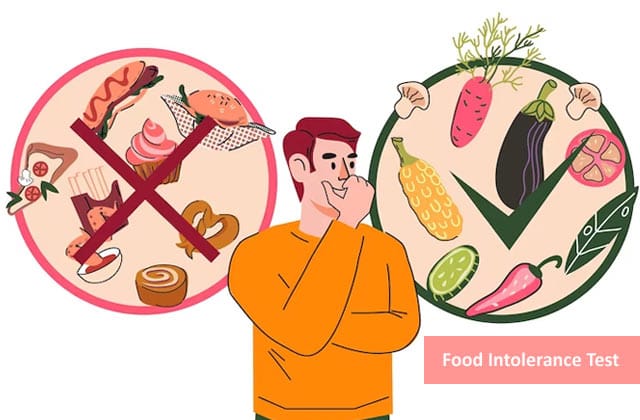Food Intolerance Screening Test
Miscellaneous (15)
- AGAR AGAR
- CANE SUGAR
- CAROB
- CHESTNUT
- COCOA BEAN
- COFFEE
- COLA NUT
- HONEY
- MUSHROOM
- RAPESEED
- SESAME SEED
- SUNFLOWER SEED
- TAPIOCA
- TEA (BLACK)
- TEA (GREEN)
Fish (38)
- ALGA ESPAGUETTE
- ALGA SPIRULINA
- ALGA WAKAME
- ANCHOVY
- BARNACLE
- BASS
- CARP
- CAVIAR
- CLAM
- COCKLE
- COD
- CRAB
- CUTTLEFISH DORADO
- EEL
- HADDOCK
- HAKE
- HERRING
- LOBSTER
- MACKEREL
- MONKFISH
- MUSSEL
- OCTOPUS
- OYSTER
- PERCH
- PIKE
- PLAICE
- RAZOR CLAM
- SALMON
- SARDINE
- SCALLOP
- SEA BREAM
- SOLE
- SQUID
- SWORDFISH
- TROUT
- TUNA
- TURBOT
- WINKLE
Nuts (11)
- ALMOND
- BRAZIL NUT
- CASHEW NUT
- COCOUNT
- HAZELNUT
- MACADAMIA NUT
- PEANUT
- PINE NUT
- PISTACHIO
- TIGER NUT
- WALNUT
Spices (31)
- ALOE VERA
- ANISEED
- BASIL
- BAY LEAF
- CAMOMILE
- CAYENNE
- CINNAMON
- CLOVE
- CORIANDER LEAF
- CUMIN
- DILL
- GARLIC
- GINGER
- GINKGO
- GINSENG
- HOPS
- LIQUORICE
- MARJORAM
- MINT
- MUSTARD SEED
- NETTLE
- NUTMEG
- PARSLEY
- PEPPERMINT
- RED CHILLI
- ROSEMARY
- SAFFRON
- SAGE
- TARRAGON
- THYME
- VANILLA
Dairy (9)
- ALPHA-LACTALBUMIN
- BETA-LACTOGLOBULIN
- BUFFALO MILK
- CASEIN
- COWS MILK
- EGG WHITE
- EGG YOLK
- GOAT MILK
- SHEEP MILK
Vegetables (39)
- AMARANTH
- ARTICHOKE
- ASPARAGUS
- AUBERGINE
- BEAN (BROAD)
- BEAN (GREEN)
- BEAN (RED KIDNEY)
- BEAN (WHITE HARICOT)
- BEETROOT
- BROCCOLI
- BRUSSEL SPROUT
- CABBAGE
- CABBAGE (RED)
- CAPER
- CARROT
- CAULIFLOWER
- CELERY
- CHARD
- CHICKPEA
- CHICORY
- CUCUMBER
- FENNEL (LEAF)
- GOURD (SQUASH)
- LEEK
- LENTIL
- LETTUCE
- MARROW
- ONION
- PEA
- POTATO
- RADISH
- ROCKET
- SHALLOT
- SOYBEAN
- SPINACH
- SWEET POTATO
- TURNIP
- WATERCRESS
- YUCA
Fruits (38)
- APPLE
- APRICOT
- AVOCADO
- BANANA
- BLACKBERRY
- BLACKCURRANT
- BLUEBERRY
- CHERRY
- CRANBERRY
- DATE
- FIG
- GRAPE
- GRAPEFRUIT
- GUAVA
- KIWI
- LEMON
- LIME
- LYCHEE
- MANGO
- MELON (HONEYDEW)
- MULBERRY
- NECTARINE
- OLIVE
- ORANGE
- PAPAYA
- PEACH
- PEAR
- PINEAPPLE
- PLUM
- POMEGRANATE
- RAISIN
- RASPBERRY
- REDCURRANT
- RHUBARB
- STRAWBERRY
- TANGERINE
- TOMATO
- WATERMELON
Cereals (18)
- BARLEY
- BUCKWHEAT
- CORN (MAIZE)
- COUSCOUS
- DURUM WHEAT
- FLAX SEED
- GLIADIN
- MALT
- MILLET
- OAT
- POLENTA
- QUINOA
- RICE
- RYE FLOUR
- SPELT
- TRANSGLUTAMINASE
- WHEAT
- WHEAT BRAN
Meat (16)
- BEEF
- BILLY GOAT
- BOX
- CHIKEN
- DUCK
- HORSE
- LAMB
- OSTRICH
- PATRIDGE
- PORK
- QUAIL
- RABBIT
- TURKEY
- VEAL
- VENISON
- WILD BOAR
Food Intolerance (1)
- FOOD INTOLERANCE PROFILE
What Is Food Intolerance Test
Have you ever had that frustrating experience where you enjoy a delicious meal, only to later find yourself dealing with digestive discomfort, skin issues, headaches, or joint pains? It’s quite perplexing, isn’t it? Well, you’re not alone. Many of us have been there, wondering which seemingly innocent food is responsible for these unwelcome reactions. Sometimes, these symptoms can even sneak up on us hours after we’ve finished our meal, making it incredibly challenging to pinpoint the culprit.
Food intolerance is referred to as a condition when your body’s immune system responds reactively to a certain food within a few minutes or hours. Food intolerances or allergies are often accompanied by skin rashes and abdominal pain, which are regarded as mild symptoms. However, certain foods might trigger an extreme reaction leading to anaphylaxis or anaphylactic shock.
Some of the common dietary items that may trigger food sensitivities include
- Milk
- Eggs
- Peanuts
- Tree nuts
- Soy
- Wheat
- Fishes and shellfishes
Food intolerance testing help your healthcare provider recognise the symptoms and gauge their extent and associated complications. While most mild symptoms of food sensitivities go away within a few hours or a few days on their own, at times, anaphylactic symptoms can be life-threatening. An on-time food sensitivity test is thus highly recommended.
About Food Intolerance Test
Learn everything about Food Intolerance Test before you book lab test online. Understand the why, how, and what of this test.
What Are The Types of Food Intolerances
Food tolerance testing type may vary depending on your symptoms and the type of food sensitivity you might have.
Some of the common food sensitivities or intolerances include:
- Lactose intolerance: It is the inability to digest lactose, the sugar found in milk and dairy products, due to a lack of lactase enzyme.
- Gluten Intolerance (Non-Celiac Gluten Sensitivity): Having digestive problems and weariness after eating gluten, a protein found in wheat, barley, and rye, but not having celiac disease.
- Fructose Intolerance (Fructose Malabsorption): is the inability to absorb fructose, a sugar found in fruits, honey, and some vegetables.
- Histamine Intolerance: Intolerance to histamine, a chemical contained in foods that is released during allergic reactions, resulting in a variety of symptoms.
- FODMAP Intolerance: Sensitivity to fermentable carbohydrates (FODMAPs) found in certain foods, which can cause stomach pain.
- Sorbitol and Mannitol Intolerance: Intolerance to sugar alcohols, sorbitol, and mannitol, which are found in various fruits, vegetables, and sugar-free goods.
- Caffeine Intolerance: Hypersensitivity to caffeine, a stimulant found in coffee, tea, chocolate, and some beverages that causes a variety of symptoms.
- Sulfite Sensitivity: It is a sensitivity to sulfites, which are food additives used for preservation, and can cause symptoms such as headaches, skin rashes, and breathing issues.
These sensitivities are often accompanied by abdominal pain, nausea, bloating and diarrhoea symptoms. Based on your symptoms, your healthcare provider will recommend the appropriate food intolerance profile tests.
Types of Tests Leveraged to Detect Food Intolerance
The key types of tests leveraged to detect food intolerances include:
- Elimination Diet
- Skin tests
- Blood tests (such as IgE Blood Test (for allergies) or IgG Blood Test (for delayed sensitivities))
- slgE test
- Allergen-specific IgE in serum tests
- Skin prick tests (SPTs)
- Oral challenge tests
Why Do I Need Food Intolerance Test?
Your healthcare provider will recommend a food intolerance testing if:
- You are exhibiting food sensitivity symptoms within a few minutes to hours of consuming certain food item
- Have symptoms, such as nausea, stomach pain, tingling sensations in the mouth, hives, rashes, coughing, stuffy, itchy or runny nose
- Have chronic anaphylactic symptoms, such as trouble breathing, dizziness, fainting, swelling of the tongue, lips, and throat, rapid heartbeat, cold and clammy skin
Children are highly susceptible to developing food sensitivities than adults. Your child will need to opt for the food intolerance blood test if she/he:
- Has Eosinophilic Esophagitis (EoE)
- Has moderate or severe eczema, enterocolitis, enteropathy and allergic proctocolitis
A food intolerance allergy test and its insights can help your healthcare provider:
- Identify whether you have any sort of food allergy
- Gauge the severity of your food allergy symptoms
- Gauge whether your symptoms have ceased or amplified
Test Result Interpretation
You’ve received your food tolerance test results, but you might be wondering whether these results fall within the normal range. This section will guide you in understanding whether your test results are considered normal or not.
What Does Food Intolerance Test Results Mean?
If the result is positive for the food intolerance test, it means you have existing symptoms of food sensitivities and you should consult with your healthcare provider for further diagnosis and appropriate treatment intervention.
If the result is negative, it might mean that you don’t have the symptoms due to a food allergy and other diagnostic measures must be sought to understand the underlying health conditions.
Why Choose HealthcareOnTime?
Convenience at Your Doorstep
Ever wished for healthcare that comes to you? HealthcareOnTime makes it a reality with doorstep lab testing, cutting out clinic hassles. No more queues or travel stress. Experience at-home sample collection, prioritizing health without time constraints. —your path to health, now just a doorstep away!
Affordable Testing with Thyrocare Partnership
Experience cost-effective lab testing at-home with HealthcareOnTime’s exclusive partnership with Thyrocare. Benefit from competitive prices while ensuring precise results. Our collaboration with Thyrocare Technologies Limited guarantees affordability without compromising on the accuracy and reliability of your lab test.
Comprehensive Health Screening
At HealthcareOnTime, we’ve got your back with our comprehensive health checkup packages! Take charge of your well-being by booking online. These packages empower you to stay ahead, catching potential issues early for timely management. It’s like having a health ally, and making informed decisions for a healthier, happier life.
Disclaimer: Although we have endeavoured to provide accurate information on this page, we strongly recommend that you seek advice from your doctor before relying on any of the test ranges or lab-test recommendations mentioned herein.
More Related Tests
Why To Book with HealthCareOnTime

17 Crores+ Samples Processed

World Class Technology Labs

25+ Years of Trust & Experience











